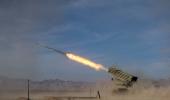Pakistan on Wednesday recalled its ambassador to Iran and suspended all high-level planned bilateral visits in the coming days, hours after Tehran launched an unprecedented missile and drone strikes on what it said were terrorist bases of a Sunni militant group in the restive Balochistan province.

Foreign Office spokesperson Mumtaz Baloch in a statement read out to the media also said that the Iranian Ambassador to Pakistan who is currently visiting Iran may not return to Islamabad for the time being. Pakistan also reserves the right to retaliate to the provocation by Iran, she said.
Two bases of Balochi militant group Jaish al-Adl in Pakistan were targeted by missiles and drones on Tuesday, Iranian state media reported, a day after Iran's elite Revolutionary Guards attacked targets in Iraq and Syria with missiles.
"We have also informed them (Iran) that Pakistan has decided to recall its ambassador from Iran and that the Iranian Ambassador to Pakistan, now on a visit to Iran, may not return for the time being. We have also decided to suspend all high-level visits which were ongoing or were planned between Pakistan and Iran in the coming days," Baloch said.

She said that last night's "unprovoked and blatant breach of Pakistan's sovereignty by Iran is a violation of international law and the purposes and principles of the Charter of the United Nations".
"This illegal act is completely unacceptable and has no justification whatsoever. Pakistan reserves the right to respond to this illegal act. The responsibility for the consequences will lie squarely with Iran," Baloch said, adding that Pakistan has conveyed this message to the Iranian government.
Separately, Balochistan information minister Jan Achakzai in his reaction to the attack by Iran said that he was "disappointed".
"We are extremely disappointed, as the Foreign Office has already said terrorism is a common threat to all countries in the region that requires coordinated action. Such acts of air space violations by #Iran undermine neighbourly relation, trust and renewed trade linkages established with #Balochistan," he said in a statement of X.
According to the Foreign office, the Iranian charge d'affaires here was summoned to the foreign ministry and issued a strongly-worded condemnation of Iran's "violation of its airspace".
Pakistan condemned the overnight attack which killed two children and injured three girls.
Iran's attack could potentially raise tensions in the Middle East, already roiled by Israel's war on Hamas in the Gaza Strip.
"Two key strongholds of the Jaysh al-Dhulm (Jaish al-Adl) terrorist group in Pakistan were specifically targeted and successfully demolished," Iran's semi-official Tasnim news agency said.
Earlier, former prime minister Shehbaz Sharif said he was shocked by the Iranian attack on his country.
Shehbaz in his reaction said that the attack was against the spirit of friendship between the two countries.
"I am shocked at the Iranian breach of Pakistani sovereignty. This missile attack is against the spirit of our friendship and principles of good neighbourliness, especially as it undermines the historic relationship between our two countries," he said.
"Sincere dialogue and meaningful cooperation between our two countries is the need of the hour. My condolences to the families who lost their loved ones in the attack," he added.
His response came when Pakistan was apparently struggling to come up with a plausible response to the unexpected Iranian attack against militants' hideouts in its remote south-western region of Balochistan, bordering Iran.
Tehran has repeatedly warned that the Jaish al-Adl militant group is using Pakistani soil in the border town of Panjgur in Balochistan to launch terror attacks on Iranian security forces.
The strikes were launched the day Pakistan's caretaker Prime Minister Anwaarul Haq Kakar met with Iranian Foreign Minister Hossein Amir-Abdollahian on the sidelines of the World Economic Forum (WEF) in Davos, Switzerland.
Jaish al-Adl, or the "Army of Justice", is a Sunni militant group founded in 2012 that largely operates in Pakistan. Iran has fought in border areas against the militants, but a missile-and-drone attack on Pakistan would be unprecedented for Iran.
Jaish al-Adl is the "most active and influential" Sunni militant group operating in Sistan-Baluchestan, according to the Office of the US Director of National Intelligence.
Last month, at least 11 Iranian police officers were killed in an attack overnight on a police station in the southeastern province of Sistan-Balochistan, according to Iranian Interior Minister Ahmad Vahidi, who blamed the Jaish al-Adl for the incident.
He claimed the Jaish militants had entered Sistan from the Pakistan side near Panjgur.
On July 23 last year, four Iranian policemen were killed while on patrol near the border in an attack claimed by the Jaish Al Adl.
In May, five Iranian border guards died in clashes with an armed group in Saravan, southeast of Zahedan, the provincial capital of Sistan-Balochistan.
Over the years, the troubled Balochistan province has become a hotbed for terror attacks, and many banned religious terror, and separatist outfits have also used its soil to carry out attacks against Pakistan's security personnel and installations.











 © 2025
© 2025